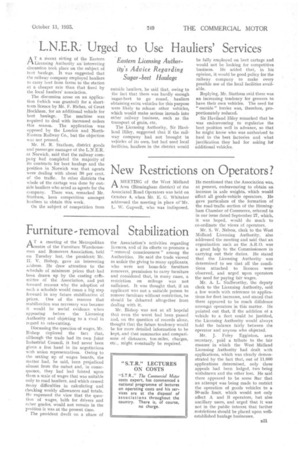L.N.E.R: Urged to Use H auliers' Services
Page 35

If you've noticed an error in this article please click here to report it so we can fix it.
Eastern Licensing Authority's Advice Regarding Sugar-beet Haulage
AT recent sitting of the Eastern Licensing Authority an interesting discussion took place on the subject of bcet haulage. It was suggested that the railway company employed hauliers to carry beet from farms to the station at a cheaper rate than that fixed by the local hauliers' association.
• The discussion arose on an application (which was granted) for a shortterm licence by Mr. F. Riches, of Great Hockham, for an additional vehicle for beet haulage. The machine was required to deal with increased orders this season. The application was opposed by the London and NorthEastern Railway Co., but the objection was not pressed.
Mr. H. R: Statham, district goods and passenger manager of the L.N.E.R. at Norwich, said that the railway company had completed the majority of its contracts for beet haulage and the position in Norwich was that agents were dealing with about 30 per cent. of the traffic. In other districts the whole of the cartage was done by outside hauliers who acted as agents for the company. There was, remarked Mr. Statham, keen competition amongst hauliers to obtain this work.
On the subject of competition from outside hauliers, he said that, owing to the fact that there was hardly enough Sugar-beet to go round, hauliers obtaining extra vehicles for this purpose were likely to release other vehicles, which would make serious inroads into other railway business, such as the transport of grain, etc.
The Licensing Authority, Sir Haviland Hiley, suggested that if the railway company had not brought in vehicles of its own, but had used local facilities, lia.uliers in the district would be fully employed on beet cartage and would not be looking for competitive business. He added that, in his opinion, it would be good policy for the railway company to make every possible use of the local facilities available.
Replying, Mr. Statham said there was an increasing tendency for growers to have their, own vehicles. The need for " outside" lorries was, therefore, proportionately reduced.
Sir Haviland Ililey remarked that he was endeavouring to regularize the beet position well in advance, so that he might know who was authorized to haul to the beet factories and what justification they had for asking for additional vehicles.




























































































